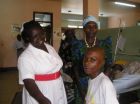(Press-News.org) September 22, 2010 – (BRONX, NY) On Monday, September 27, researchers from Albert Einstein College of Medicine of Yeshiva University will hold a congressional briefing in Washington, D.C., aimed at focusing attention on the alarming global diabetes epidemic. Incidence of diabetes is increasing worldwide at a rate that eclipses most other diseases. The World Health Organization estimates that by the year 2030, more than 366 million people will be suffering from diabetes, 10 times the number affected by HIV/AIDS. Of that 366 million, more than 298 million will live in developing countries.
"In the developing world, there are tremendous barriers to addressing the global diabetes epidemic," said Meredith Hawkins, M.D., professor of medicine and director of the Global Diabetes Initiative at Einstein. Dr. Hawkins, who has travelled globally treating diabetes patients, is eager to provide testimony at the briefing. "There's a lack of awareness by the general population, a lack of knowledge by healthcare providers on how to treat the disease, and no coordinated healthcare policy that would make screening, treatment, and prevention a priority. There are also practical limitations including access to clinical care settings, few resources for treatment, and poorly developed healthcare infrastructure to support chronic and acute treatment. However, despite these grave challenges, the consequences of doing nothing are dire."
Through her extensive diabetes field work in Africa, Asia, and Latin America, Dr. Hawkins has observed many different forms of diabetes including a mysterious and under-recognized form – one that is linked to starvation and malnutrition. "People on the ground, especially in sub-Saharan Africa and India, say they are seeing many more cases of diabetes among young and lean individuals compared to 20 years ago," said Dr. Hawkins. This 'malnutrition diabetes' is often misdiagnosed as type 1 diabetes, leading to ineffective and often fatal treatments. And it's believed to affect large numbers of children and young adults in the developing world.
"So little is known about malnutrition diabetes," said Dr. Hawkins, "but it's very clear that what we're seeing is not Type 1 or Type 2 diabetes. This is a debilitating, poorly understood form of the disease that strikes those with poor nutrition -- many of them children. We desperately need more research to understand why it occurs, and more research resources to develop effective and practical treatments."
The congressional briefing, expected to be well attended by health and foreign affairs legislative aides of congressional members, will be jointly presented by the Global Diabetes Initiative and the Global Diabetes Alliance. In addition to Dr. Hawkins, the event will include testimony from Dr. Nihal Thomas, professor at Christian Medical College in Vellore, India, which has developed several highly effective diabetes outreach programs, as well as Dr. Paul Robertson, director of the Global Diabetes Alliance and Dr. Mahmoud Ibrahim, director of the Egyptian Diabetes Center. The briefing will be held in Room B-339 of the Rayburn House Office Building on Capitol Hill beginning at 12 noon.
INFORMATION:
Albert Einstein College of Medicine researcher to brief Congressional staffers on global diabetes
2010-09-22
ELSE PRESS RELEASES FROM THIS DATE:
The psychology of financial decision making and economic crises
2010-09-22
How could the current financial crisis have happened? While fingers have been pointing to greedy banks, subprime-loan officers, and sloppy credit card practices, these are not the only contributors to the economic downturn. A new report in Psychological Science in the Public Interest, a journal of the Association for Psychological Science, examines the psychology of financial decision making, including the role of risk in making economic choices, how individuals behave in stock and credit markets, and how financial crises impact people's well-being.
Risk taking is a ...
Taste genes predict tooth decay
2010-09-22
Alexandria, Va., USA – Dental caries is a highly prevalent disease that is disproportionately distributed in the population. Caries occurrence and progression is known to be influenced by a complex interplay of both environmental and genetic factors, with numerous contributing factors having been identified including bacterial flora, dietary habits, fluoride exposure, oral hygiene, salivary flow, salivary composition, and tooth structure. Previous reports have characterized the influence of the genetic variation on taste preferences and dietary habits.
In an article ...
Mayo Clinic finds inflammation causes some postsurgical neuropathies
2010-09-22
ROCHESTER, Minn. -- A new Mayo Clinic study found that nerve inflammation may cause the pain, numbness and weakness following surgical procedures that is known as postsurgical neuropathy. The development of postsurgical neuropathies is typically attributed to compression or stretching of nerves during surgery. This new research shows that, in some cases, the neuropathy is actually caused by the immune system attacking the nerves and is potentially treatable with immunosuppressive drugs. The study was published in this month's issue of Brain.
Postsurgical neuropathy is ...
Cocaine and ecstasy detected in waters of the L'Albufera in Valencia
2010-09-22
The water in the canals and irrigation channels in the L'Albufera Natural Park in Valencia contain cocaine, ecstasy and a further six drugs. This has been confirmed by a study carried out by researchers from the University of Valencia (UV), who have issued a warning about the continued presence of these substances on wildlife and human health.
"The results confirm the presence of drugs such as cocaine, amphetamines, codeine, morphine and cannabis in the surface waters of the L'Albufera National Park at levels ranging between 0.06 and 78.78 nanograms/litre", Yolanda Picó, ...
IVF does not negatively affect academic achievement
2010-09-22
Children conceived by in vitro fertilization (IVF) perform at least as well as their peers on academic tests at all ages from grade 3 to 12, according to a new University of Iowa study.
In fact, the study, published in the October issue of the journal Human Reproduction, found that children who were conceived by IVF actually scored better than age- and gender-matched peers on the Iowa Test of Basic Skills and the Iowa Test for Educational Development (ITBS/ED).
"Our findings are reassuring for clinicians and patients as they suggest that being conceived through IVF ...
New drug could help stop the spread of disease during cough: U of A research
2010-09-22
What if there was a drug that could completely eliminate airborne disease transmission that occurs when someone coughs? Researchers at the University of Alberta believe they have found a way to achieve this.
The idea behind this work came from Malcolm King and his research associate Gustavo Zayas, who work in the Division of Pulmonary Medicine at the U of A's Faculty of Medicine & Dentistry. King and Zayas developed a drug that, when inhaled, would reduce or eliminate the amount of droplets, called bioaerosol, coming out of the mouth when a disease-infected person coughs. ...
Toward the first nose drops to treat brain cancer
2010-09-22
Scientists are reporting the development and successful initial testing of a new form of methotrexate — the mainstay anticancer drug — designed to be given as nose drops rather than injected. It shows promise as a more effective treatment for brain cancer, they say. The report appears in ACS' Molecular Pharmaceutics, a bi-monthly journal.
Tomotaka Shingaki and colleagues note that brain cancer is difficult to treat, partly because current anticancer drugs have difficulty reaching the brain. That's because the so-called blood-brain barrier (a protective layer of cells ...
Talking while walking puts Parkinson's patients at risk for falls
2010-09-22
We've all heard the saying about people who can't walk and chew gum at the same time, but it turns out that walking and talking is difficult enough, especially for people with Parkinson's disease who are at increased risk for falls with injury.
A new Florida State University study found that older adults with Parkinson's disease altered their gait — stride length, step velocity and the time they spent stabilizing on two feet — when asked to perform increasingly difficult verbal tasks while walking. But the real surprise was that even older adults without a neurological ...
Ingredient in soap points toward new drugs for infection that affects 2 billion
2010-09-22
The antibacterial ingredient in some soaps, toothpastes, odor-fighting socks, and even computer keyboards is pointing scientists toward a long-sought new treatment for a parasitic disease that affects almost two billion people. Their report on how triclosan became the guiding light for future development of drugs for toxoplasmosis appears in ACS' monthly Journal of Medicinal Chemistry.
In the study, Rima McLeod and colleagues point out that toxoplasmosis is one of the world's most common parasitic infections, affecting about one-third of the world population, including ...
NYU Langone researchers present at Transcatheter Cardiovascular Therapeutics scientific symposium
2010-09-22
Researchers from the Cardiac & Vascular Institute at NYU Langone Medical Center will present at the Transcatheter Cardiovascular Therapeutics (TCT) 2010 scientific symposium on September 21-25, 2010 in Washington, DC. They will be available for interviews during the conference.
Louis Miller, MD
Interventional Cardiology Fellow, Department of Medicine, Leon H. Charney Division of Cardiology at NYU Langone Medical Center
Wednesday, September 22, 2010
Presenter
•Very Long-term Clinical Follow-up After Fractional Flow Reserve-Guided Coronary Revascularization, ...


